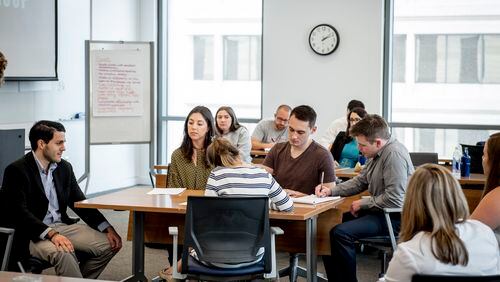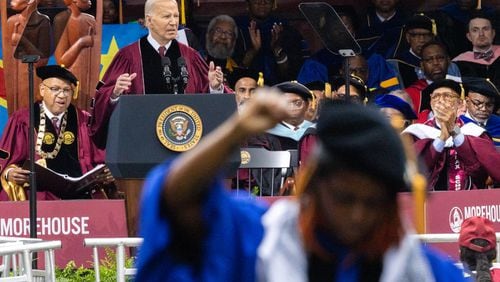Growing up in rural Georgia, Baylee Culverhouse learned about the complexities of the health care industry through her physician father. But the profession wasn’t for her.
“I took more to writing and researching,” she said. “So when I found out that Georgia State’s law school had the Number 2 health law program in the nation, I immediately wanted to get involved.”
Culverhouse graduates this month with a master’s in health administration and a law degree with a health law certification. In the years she’s been honing her skills, the program moved from Number Two to being the top-rated one of its kind in the country, according to U.S. News and World Report.
“We’ve been in the top 10 for last 15 years, but this is the first time we’ve ranked Number 1,” said Erin Fuse Brown, an associate law professor and director of GSU’s Center for Law, Health and Society. “It’s a nice recognition of the high quality program we offer.”
Having a particular expertise in health care law prepares future attorneys to tackle the myriad of issues the industry deals with, said Fuse Brown, an attorney who represented health care companies and hospitals before pivoting into academia.
“People often assume it’s medical malpractice, but it’s quite a bit bigger,” she said. “Health care is one of the most regulated industries out there. Employers need people who understand and practice health law.”
The program launched in 2004 with a handful of classes and expanded over time, said Stacie Kershner, the law center’s associate director. “We explain to incoming students that if they’re interested in this particular aspect of the law, this is a way to focus their efforts. They’ll come out with a generalist’s degree, but they’ll also have foundational knowledge in the health, too.”
One of the hallmarks of the program is HeLP, the school’s partnership with Children’s Healthcare of Atlanta and the Atlanta Legal Aid Society. Students work with low-income families and their medical teams to tackle tough issues that impact health. Supervised by clinical faculty, students might take on cases of housing conditions, childhood disabilities and health care access, or draft wills and advanced directives. A collaboration with the medical schools at Emory and Morehouse allows GSU’s students to learn alongside medical students, residents and graduate students in public health, social work and bioethics.
“Sometimes clients need what’s beyond what a doctor or hospital can provide, things like help with Social Security benefits, for example,” said Fuse Brown. “Students work with real clients on cases with real-world applications. They’re doing something for people who really need these benefits, and our students love the experience.”
Culverhouse was part of a clinic team that worked on six cases during the spring semester. “The focus is always on helping clients through the judicial system,” she said. “Some may not have the time or legal literacy to confront these issues, and we can help while getting class credit and experience.”
Clinical experience was just one factor that confirmed for Culverhouse she’d made the right career choice.
“One of my favorite things is being part of a strong alumni network,” she said. “I’ve also worked with our professional development team that’s connected me to health care internships at Grady, the CDC and a malpractice insurance company. It’s been great to have those opportunities.”
Information about the Georgia State College of Law is online at law.gsu.edu.
SEND US YOUR STORIES. Each week we look at programs, projects and successful endeavors at area schools, from pre-K to grad school. To suggest a story, contact H.M. Cauley at hm_cauley@yahoo.com or 770-744-3042.
About the Author






